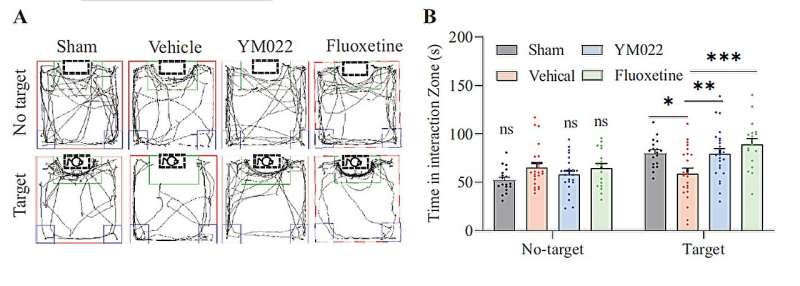Learn about brain health and nootropics to boost brain function
A small molecule blocks aversive memory formation, providing a potential treatment target for depression

The YM022-treated mice (diagram A, second from right) spent significantly more time in the social interaction zone (framed with a green line) than the control group when the aggressive mouse was placed in the acrylic cage. The findings indicate that the treated mice exhibited less social avoidance and depressive-like behaviour induced by the previous attack. Credit: Zhang, X. et al., source: https://www.nature.com/articles/s41380-023-02127-7 Depression is one of the most common mental illnesses in the world, but current anti-depressants have yet to meet the needs of many patients. Neuroscientists from City University of Hong Kong (CityU) recently discovered a small molecule that can effectively alleviate stress-induced depressive symptoms in mice by preventing aversive memory formation with a lower dosage, offering a new direction for developing anti-depressants in the future.
“Depression affects millions of individuals worldwide, necessitating more effective treatments. Conventional methods, such as drug therapy with delayed onset of action and psychotherapy, have limitations in yielding satisfactory results for many patients. A pioneering advancement in treatment is urgently needed,” said Professor He Jufang, Wong Chun Hong Chair Professor in Translational Neuroscience at CityU.
Previous research found that stress leads to neural plasticity changes in brain’s valence-coding systems (“valence” refers to the degree to which something is pleasurable or aversive), which are strongly associated with depression, post-traumatic stress disorders and anxiety disorders.
Also, some studies revealed that depression is correlated with the hyperactivated amygdala. “However, the neural mechanism that mediates depression in amygdala is still poorly understood,” said Professor He.
Over the years, Professor He’s research group has focused on memory formation and encoding studies. Previously, they discovered that cholecystokinin (CCK), a key neuromodulator, is crucial for inducing long-term potentiation (LTP)—a lasting increase in communication strength between neurons—to enable memory formation.
They also found that the CCK and CCK-B receptors (CCKBR is one of three known types of CCK receptors in the central nervous system) mediate neuroplasticity, as well as visual and sound associative memory formation, in the auditory cortex, and trace fear memory formation in the amygdala.
Other studies have found that CCKBR antagonist (which blocks the binding of the CCK and CCK-B receptors, thus inhibiting the effect of the binding) exhibited an anti-depressant effect in mice.
So Professor He’s group hypothesized that CCK might facilitate aversive memory formation by enabling LTP in the basolateral amygdala (BLA)—a brain region involved in processing emotional memories and thought to be dysregulated in depression, thus enhancing the development of depression.
In their latest study, they tested this hypothesis using various experimental methods, including in vitro electrophysiological recording, optogenetic manipulation, drug manipulation and behavioral analysis of mice, to examine the critical role of CCK and CCKBR in depression. They found that a CCKBR antagonist called YM022 had an anti-depressant-like effect by blocking neuroplasticity-caused aversive memory formation in mice.
The study was published in Molecular Psychiatry , titled “Cholecystokinin B Receptor Antagonists for the Treatment of Depression via Blocking Long-term Potentiation in the Basolateral Amygdala.”
The results of the in-vitro recording in the BLA showed that the YM022 significantly suppressed neuroplasticity. The neuroplasticity induction rate reached 72.3% in the control group; but it was only 10.2% in the drug-treated group.
Moreover, the team underwent a series of behavioral tests to determine the antagonist’s efficacy. The results showed that depressive behaviors in mice treated with a CCKBR antagonist was reduced.
“Remarkably, the YM022 shows anxiolytic effects with a dose of 3.0 ug/kg, which is 3,000 times lower than the required dosage of current antidepressants,” said Professor He.
“These results indicate that CCKBR is a potential target for depression treatment, and that the selected antagonist, YM022, may be a good anti-depressant candidate due to its extremely small effective dose. This paves the way for targeted drug development that specifically addresses the abnormalities observed in the basolateral amygdala.”
Next, the research team will focus on the precise mechanisms and potential side effects of CCKBR antagonists to set the stage for future clinical trials involving human subjects.
Provided by City University of Hong Kong
Read more at medicalxpress.com